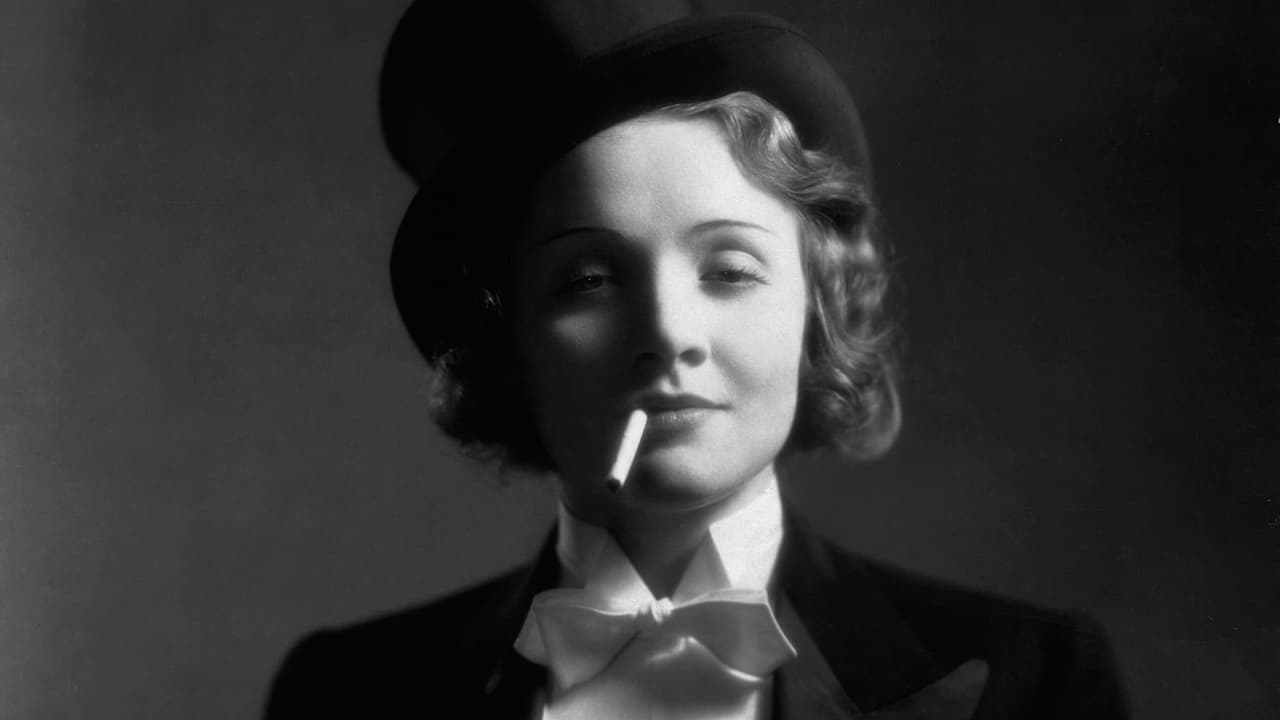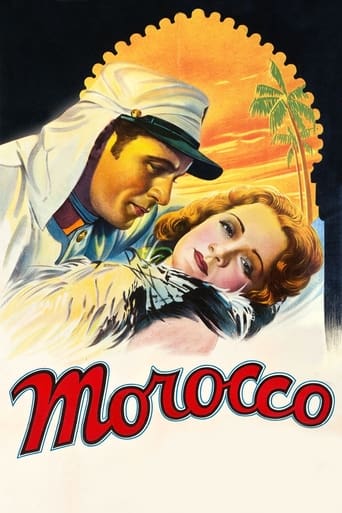PiraBit
if their story seems completely bonkers, almost like a feverish work of fiction, you ain't heard nothing yet.
pointyfilippa
The movie runs out of plot and jokes well before the end of a two-hour running time, long for a light comedy.
Quiet Muffin
This movie tries so hard to be funny, yet it falls flat every time. Just another example of recycled ideas repackaged with women in an attempt to appeal to a certain audience.
Gary
The movie's not perfect, but it sticks the landing of its message. It was engaging - thrilling at times - and I personally thought it was a great time.
gavin6942
A cabaret singer (Marlene Dietrich) and a Legionnaire (Gary Cooper) fall in love, but their relationship is complicated by the results of his womanizing and due to the appearance of a rich man who wants her for himself.According to Robert Osborne of Turner Classic Movies, Cooper and von Sternberg did not get along. Von Sternberg filmed so as to make Cooper look up at Dietrich, emphasizing her at his expense. Cooper complained to his studio bosses and got it stopped. When Dietrich came to the US, von Sternberg welcomed her with gifts including a green Rolls-Royce Phantom II which featured in some scenes of "Morocco".As I understand it, Dietrich was already a star in Germany, and this was her big transition to Hollywood. Clearly someone noticed because they gave her an Oscar nomination and her scene in the coattails is now considered iconic (and even a bit racy). World, meet Marlene Dietrich!
Edgar Soberon Torchia
After making remarkable naturalistic masterpieces as "Underworld", "The Docks of New York" and "The Blue Angel", Josef von Sternberg made "Morocco", but instead of the rigorous visual and thematic baroquism that worked so well in his own "The Last Command", he opted for the cheap Hollywood exoticism of long cinematic tradition, before and after this African adventure. First of the American films he made with Marlene Dietrich, "Morocco" is one of those heavily static products made during the first years of sound cinema, when the use of the new equipments was shy, and registering sound prevented cameras from moving as freely as they did during the silent period. But aside these technical restrictions, "Morocco" is a melodrama in the limits of idiocy, with a sure foot on the land of ridiculousness; it is a cult film more than anything else, with Marlene flaunting boas and male attire, sending lesbian messages and singing nonsense, while a young and bony Gary Cooper and Adolphe Menjou in his typical Frenchified impersonation, revere her, as those who selected this dubious entry to the National Film Registry. Watch it only as curio.
terryhill-1
It's interesting to read other reviews of Morocco. Some people just don't seem to have a clue, and it would be fascinating to learn what they think of as a good film from this era. Nevertheless, I was surprised to see that only one reviewer mentioned the sound, and that was to criticize it. Sternberg's use of sound as a tool jumped right out at me. There are numerous scenes in this film which have the possibility of being overly tedious and run the risk of being boring. Much is made of Sternberg's visual prowess and the rich texture displayed here, but I'm surprised that everyone seems to be missing the effect of the sound. Throughout the film, in scenes which need to build tension yet are visually somewhat tiresome (Legionaires marching in the street for example) Sternberg uses various sound devices artfully. We hear the monotonous drumbeat as the men march. The longer this goes on, the more irritating it becomes and as a result, puts the audience on edge. This adds to the tension of the scene immensely. The same thing happens in other parts of the film when we hear a short nearly monotone musical phrase repeated over and over ad nauseum, or when the sound of the wind blowing through the trees also becomes irritating. Each time, the scene is intended to build tension and each time, Sternberg's use of sound perfectly complements the visual to achieve the desired effect. This movie is on my "you gotta see this one" list.
barter2009
Why should we watch now this eighty years old film, made in black and white, slow moving forward, with only latent developing story? I'll try to answer this question. The thrill of "Morocco" lies in the characters of the protagonists, played by unforgettable Marlene Dietrich and Gary Cooper. I believe, Voltaire said once that the most beautiful thing in the world is a human face, and it seems to be true, when you watch their faces.The sparkles between a legionnaire Tom Brown (Cooper) and a singer Amy Jolly (Dietrich) are immense, it's love from the first sight, we see this on his face and we see it in her handling him the key from her flat, just in the first evening.While the rich gentleman Le Bessiere (Adolphe Menjou) is at the beginning just curious about her and her further fate, and only later gets really involved with her, the young legionnaire seems to be blown off by her first appearance on stage. Amy Jolly has certainly no "stage fright", she knows very well how to play audience, and doesn't need any advice from the owner of the place. She attracts attention by wearing her extravagant costume and then by taking a flower from a woman's hair and kissing her (rather teaching her manners than anything else). And then suddenly this flower will be given away: to Tom Brown. So we see the very beginning of the romance, and we see the reactions of the audience.The thrill is in the nuances, in the play of shadows and light. Perhaps, the pauses in the dialogs are as meaningful as the words: when Tom Brown says: "Nothing... yet!", we know already what kind of fellow he is, or even more famous example: Amy Jolly says after a long pause: "I'll be back... wait for me." It's more impressive than those dozen words she could fill in this empty time space. But the intensity of the scene would be lost! I must also stress the brilliance of the love dialogs in "Morocco". For instance it's a wonderful line, when Amy Jolly says to Tom Brown: "You should go now... I'm beginning to like you." It's a deeper insight into a woman's soul.About the rich man: somehow he seems rather playing games with Amy Jolly, so he provokes her by saying about the women following the legion into the desert that they love their men. I guess the meaning of his words was that she, Amy, does not love anyone really, and then she belongs to him, into his world. If she does, she should make her choice.Cooper gives a genius imitation of the way Tom Brown speaks: he speaks like a soldier, in a hacked, simple, straight forward manner.At the end of the film Amy Jolly takes off her shoes to follow her man; maybe this scene has influenced the other film makers ("The red shoes" (1948) and "The river of no return" (1954)).What is also interesting about "Morocco" is a multilingual surrounding: we hear English, French, German, Arabic and Spanish.In my opinion it's the best not only of Dietrich, but also of the young Cooper, because only after seeing "Morocco" I start to believe in him as a charming Casanova from Hollywood.

